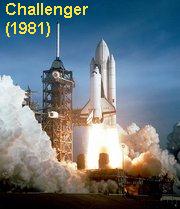Public Support and
Challenges
Despite advances in technology, education, and
more efficient uses of resources, both the United States and Russia have had a
few major setbacks in their space program history. The primary cause for
setbacks is funding; without public support, these programs would not be
possible.
 Another major setback
is evaluating safety standards after the loss of life. All cosmonauts understand
the risks of their jobs, but still believe the benefits are worth the risks.
Virgil Grissom of Apollo 1 who passed away in a fire during a preflight test at
the launch pad stated, "If we die, we want people to accept it. We are in a
risky business, and we hope that if anything happens to us it will not delay the
program. The conquest of space is worth the risk of life." (Alexandria, 1989)
Another major setback
is evaluating safety standards after the loss of life. All cosmonauts understand
the risks of their jobs, but still believe the benefits are worth the risks.
Virgil Grissom of Apollo 1 who passed away in a fire during a preflight test at
the launch pad stated, "If we die, we want people to accept it. We are in a
risky business, and we hope that if anything happens to us it will not delay the
program. The conquest of space is worth the risk of life." (Alexandria, 1989)
In 1986, the space shuttle Challenger exploded on reentry into the atmosphere
due to a defective joint in the rocket's motors causing damage to the shuttle
during liftoff. Modifications were made to the design of the shuttle and test
programs were set up to ensure that the problems had been resolved. It wasn't
until 1988, that the United States sent another manned spaceflight. (Hamilton,
2001)
Then again, recently in February of 2003, the Columbia exploded after liftoff
killing all on board due to a faulty seal. (Wikipedia, 2004)
Recently, many parties have shunned the use of these 20 year old shuttles
because of their old designs, aged reusable parts, their expense to maintain,
and lack of safety.



 Another major setback
is evaluating safety standards after the loss of life. All cosmonauts understand
the risks of their jobs, but still believe the benefits are worth the risks.
Virgil Grissom of Apollo 1 who passed away in a fire during a preflight test at
the launch pad stated, "If we die, we want people to accept it. We are in a
risky business, and we hope that if anything happens to us it will not delay the
program. The conquest of space is worth the risk of life." (Alexandria, 1989)
Another major setback
is evaluating safety standards after the loss of life. All cosmonauts understand
the risks of their jobs, but still believe the benefits are worth the risks.
Virgil Grissom of Apollo 1 who passed away in a fire during a preflight test at
the launch pad stated, "If we die, we want people to accept it. We are in a
risky business, and we hope that if anything happens to us it will not delay the
program. The conquest of space is worth the risk of life." (Alexandria, 1989)